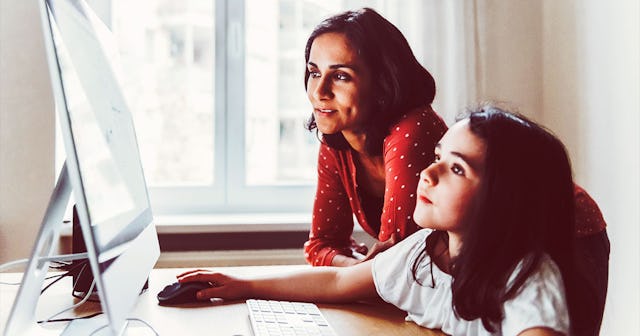Why Most Of Us Suck At Homeschooling

My father’s attempt at teaching me how to use a semicolon was a tragedy. He was enthusiastic about helping me with my homework, especially as English was his forte. I was in second grade so I only recognized basic punctuation. My father’s preferred teaching technique was the Socratic Method.
“What do you think it is?” he asked.
“A period over a comma,” I responded.
“But what do you think it does?” my father continued.
“I don’t know. I think it’s supposed to go between two words?” I pleaded.
“Why?” he pressed.
“Because that’s where you put it?” I answered.
This conversation continued for over two hours as I begged my father to give me the answer. When my mother came home, she was annoyed because I was still awake.
“You’re trying to explain what a semicolon is?” she snapped. “It separates two complete and equal clauses that are related to each other. Now get to bed!”
My mother explained to my father that the Socratic Method is for adults who have pre-existing prejudices or illogical notions about complex matters. It is not for children who have no previous opinion or knowledge of a concrete fact. But my father insisted he knew better.
The irony of this tutoring session? Both of my parents are teachers who have graduate degrees in education and decades of teaching experience.
damircudic/Getty
When I see headlines about parents attempting to homeschool their children during the pandemic, I think of this childhood experience and shudder. Although my parents were very dedicated public school teachers, they were less than satisfactory teachers at home. They regarded me as their youngest child instead of a student. Our familial relationship allowed them to show their frustration faster and more easily. They were teaching me long division while nagging me about taking out the trash. My father would insist that my teacher was wrong about a minor detail, and he would “redo” the lesson and confuse me. My mother openly expressed skepticism of my history and English course materials. Most importantly, no educational standards, boundaries or expectations were applied.
I imagine conversations like these are one of the many reasons why doctors aren’t allowed to treat their own children. No one wants to receive medical treatment and admonishment over too many video games at the same time.
Putting familial relationships aside is one of many requirements to be an effective homeschooler. Teachers, like doctors, accountants, lawyers, engineers, nurses, etc., are trained professionals. Although the education field is subject to frequent mockery and disrespect, teachers must possess specific qualifications to work: obtain a college degree, fulfill student teaching hours, complete mandatory training, and pass knowledge-based exams. (However, unlike teachers, accountants do not have to buy office supplies with their personal money.) Successful homeschooling parents must have similar abilities.
The primary reason teaching looks easy is because we think we can effortlessly convey our knowledge to willing participants, such as giving directions or explaining how to change a flat tire. Yet this superficial outlook ignores the daily challenges in the classroom: learning abilities, Individualized Education Programs, discipline, standardized tests, individual temperaments, state and federal mandates, bureaucracy, daily lesson planning, and strained budgets. Although homeschool environments face similar difficulties on a smaller scale, those issues still have a tremendous effect on academic outcomes.
The combination of this overly simplistic approach, the emotional history we have with our children, the pandemic’s severe limitations and stress, and constant work obligations means any attempt at homeschooling will be a struggle.
To be sure, I’m confident there are parents whose homeschooled children are flourishing academically. One of my homeschooled colleagues on Capitol Hill learned algebra and trigonometry from her father, and she would eventually attend a top tier university. However, such achievements are not the norm in a pandemic. The successful homeschooling parent doesn’t simultaneously work from home full-time while having no ability to leave the house for educational opportunities.
If my parents couldn’t successfully tutor me in the very same public education system that employed them as teachers during a non-pandemic time, then what hope do the rest of America’s parents have? For now, we have to do the best we can until the time when our children return to school where qualified professionals lead the way.